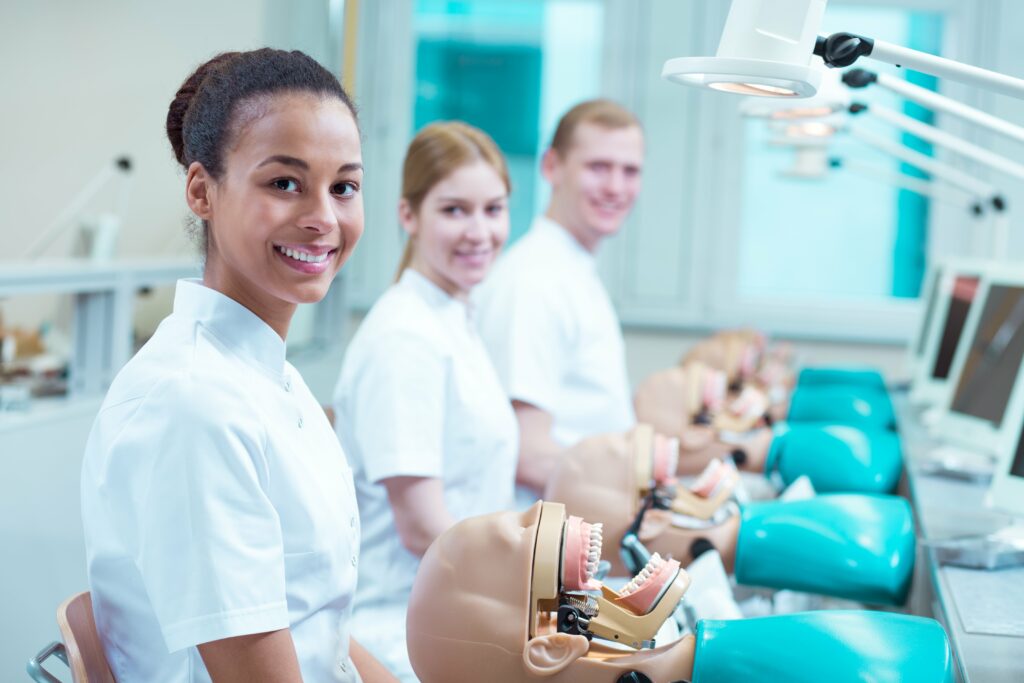Contrary to popular belief, dentists ARE physicians. However, they focus specifically on the conditions of the teeth, gums, and many other aspects of the oral cavity. As a general dentist, this can include a range of procedures, from removing cavities and placing fillings to extracting teeth, fabricating crowns, and diagnosing other oral health conditions. They often oversee a team of dental hygienists and dental assistants to properly run a successful dental practice. Some dentists choose to further their education beyond general dentistry and specialize in a field like endodontics, oral surgery, periodontics, cosmetics, orthodontics, etc.!
Do You Have What It Takes?
For aspiring dentists, it’s important to understand what your education journey will likely look like. Get ready for some serious study time. Typically, dentists must have four years of undergrad to apply for dental school, which, if accepted, is an additional four years. Undergrad degrees that are best for those looking to apply to a dental school can include biology, chemistry, human anatomy, physics, and physiology.

Once accepted to dental school, the dedication truly begins. This time can be challenging and often requires as many as 40 hours a week in class, not including study time! Weekends are often sacrificed for study time, especially the first two years. The second half of dental school consists of more clinical work and preparation for your board exams. At the completion of dental school, you will be awarded your DDS (Doctor of Dental Surgery) or DMD (Doctor of Medicine in Dentistry/Doctor of Dental Medicine). These are the same degree essentially and simply depends on the university that you attend.
Before we discuss if a dental career is worth it, we should cover what skills are needed to be sure you are the right candidate for this position.
Skills Needed to Be a Dentist
- A strong attention to detail is extremely important as a practicing dentist. When evaluating a patient’s oral cavity, it’s crucial to pay attention to small details to diagnose properly. Our oral cavity is not very large and requires attention to the smallest of details.
- Having skills in communication is another must-have for dentists. If you struggle to communicate with others, it can impact your care and whether patients return to see you!
- Manual dexterity is another must-have when it comes to practicing dentistry. Many dental instruments have blades, strange angles, and high-speed settings such as drills and polishing tips. If you aren’t good with your hands, dentistry is probably not the best option for you or your patients! It’s important to note that it’s totally normal to fumble and feel awkward when you first learn how to use these instruments, but over time, this skill should build to the point that you feel in control and confident.
- Interpersonal skills are also vital to having good relationships and building rapport with patients. Interpersonal skills will keep your patients coming back to you because they truly trust you! We have all heard of good bedside manner when referring to doctors in general. I like to say dentists should have good chairside manners.
- Compassion is last on the list but certainly not the least important skill to have as a practicing dentist. Many patients loathe going to the dentist, and it’s quite honestly the last place they want to be. Often there are patients with past experiences that have left them with trauma or anxiety. This is where compassion can set you apart from other dentists. Having compassion will help ease your patients’ minds and, in general, make their experience in the dental chair more pleasant. At that point they’ll be more likely to return to your office; it’s a win-win for everyone!
PROS
If you have the skills listed above and are ready for the challenge of dental school, a dental career can be a fantastic career option. Here are some other pros and cons of becoming a dentist:
Work-Life Balance

Being a doctor is often thought of being extremely demanding, with little time off. While as a dentist, you will certainly be busy with patients, you also can balance your schedule in a more realistic way than, say, an ER doctor who is always on call. This is a major benefit for dentists looking to have a good work-life balance or those looking to grow their families. The occasional dental emergency can certainly happen on weekends and holidays, but it’s not nearly as common as other medical doctors.
Rewarding
Working with patients and helping them overcome fears, anxieties, and pains can seriously make you feel great about what you do! Helping others should be important to aspiring dentists as this is quite literally what you will be doing all day long. Improving a patient’s ability to smile, chew, or just get them out of pain can make you feel all kinds of good about the work you do! Studies show helping others is good for us and makes us feel better. Not every career gets to do this all day like a dentist can; how cool is that?
Great Pay

While dental school is not even close to being cheap, you will make back the money (in time). According to research, dentists on average will earn back the money they spent on their dental education and more after about eight years’ time! According to Indeed, the average income for a dentist in the United States is about $236,878 a year. A competitive and comfortable income helps you reach many financial goals and stability.
CONS
Ah yes, there are some downsides to being a dentist (as there are with any job.) Here are a few of them:
Education Cost
While dentists make quite a comfortable salary, it’s important to understand the initial debt you will likely have to take on at the beginning of your journey to become a dentist. The average dental graduate leaves school with anywhere from $200,000 to $400,000 in debt. I know…you’re sweating already. While these numbers are steep, it’s possible to pay it all back if you budget your income appropriately.
Physical Demands
This has got to be one of the top cons of being any dental professional. Sitting for the majority of your day, leaning over to look into a patient’s mouth, and moving your body in ways to accommodate patients truly takes a toll on your body. Repetitive movements can affect your hands, wrists, neck, and back are common occurrences of physical challenges dentists will face in their careers. While these aches and pains can come after many years of practice, it’s important to remember you can reduce the likelihood of injuries and pain with proper ergonomics. Special chairs to help with your posture and magnification glasses to reduce hunching and stretching throughout your day can go a long way. Like any job, staying physically active and taking care of your own health will benefit you in the long run!
If you resonate with the skills we discussed and the pros more than the cons list, becoming a dentist may be for you! I recommended that aspiring dentists shadow a practicing dentist to truly get the real-life experience to feel it out for themselves!





















